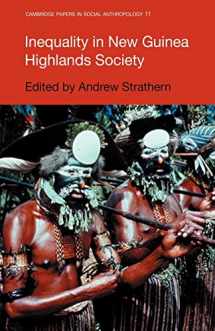
Inequality in New Guinea Highlands Societies (Cambridge Papers in Social Anthropology, Series Number 11)
ISBN-13:
9780521107846
ISBN-10:
0521107849
Author:
Andrew Strathern
Publication date:
2009
Publisher:
Cambridge University Press
Format:
Paperback
204 pages
Category:
Cultural
,
Anthropology
FREE US shipping
Book details
ISBN-13:
9780521107846
ISBN-10:
0521107849
Author:
Andrew Strathern
Publication date:
2009
Publisher:
Cambridge University Press
Format:
Paperback
204 pages
Category:
Cultural
,
Anthropology
Summary
Inequality in New Guinea Highlands Societies (Cambridge Papers in Social Anthropology, Series Number 11) (ISBN-13: 9780521107846 and ISBN-10: 0521107849), written by authors
Andrew Strathern, was published by Cambridge University Press in 2009.
With an overall rating of 4.3 stars, it's a notable title among other
Cultural
(Anthropology) books. You can easily purchase or rent Inequality in New Guinea Highlands Societies (Cambridge Papers in Social Anthropology, Series Number 11) (Paperback) from BooksRun,
along with many other new and used
Cultural
books
and textbooks.
And, if you're looking to sell your copy, our current buyback offer is $0.3.
Description
Now reissued in paperback with a new preface. The Highlands societies of Papua New Guinea, which have been studied intensively by numerous anthropologists since the 1950s, have been widely described as egalitarian and as characterised by achieved leadership. The Melanesian 'big-man' system, in which men achieve social status largely by their manipulation of wealth in elaborate structures of ceremonial exchange, has become an established anthropological model. However research has suggested that this interpretation has underestimated the elements of structured inequality within these societies, and that the classic picture should be modified and supplemented. The five papers in this volume seek to illuminate patterns of inequality in Highlands societies, which revolve around the categories of elders/juniors, big-men/workers and men/women. In setting these into a context of long-term and recent social changes, they also aim to develop schemes of analysis which will permit discussion of the societies over extended periods of time.


We would LOVE it if you could help us and other readers by reviewing the book
Book review

Congratulations! We have received your book review.
{user}
{createdAt}
by {truncated_author}


